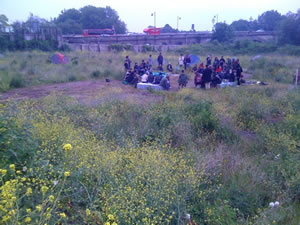A New Wave of Recycling — Squatting With A Purpose
Eco groups claim to be saving the planet, but is it a ruse to avoid rent?
Journalist Lucie Greene wrote an thought provoking article in The Sunday Times last week about the Eco Village sited next to Kew Bridge.
She introduces us to the new wave of recycling — squatting with a purpose. With examples springing up around the country, squatters rescue vacant buildings and wasteland with a view to creating ecologically sustainable communities.
Visiting the Kew Bridge site she writes, "It is a scorching sunny afternoon in a disused field on the corner of Kew Bridge. Butterflies flit from plant to plant while the warm breeze caresses the trees. A young woman in a pretty floral-print top and baggy trousers sits meditating; another, in vest and baggy combat trousers, digs through raised flower and vegetable beds. Men work on wooden yurts, while well-dressed, well-meaning members of the local community pop in to donate seeds, topsoil and firewood. Throw wind chimes and frothy lattes into the picture and it is not a million miles from a home counties garden centre. Except that it is, in fact, a squat.
"The number of eco-squats, or ecovillages, in Britain is rising. In April, squatters took over a disused farm near Guildford, Surrey, intending to create a sustainable community farm. Earlier in the year, the same group, part of the Circle Community, took over Raven’s Ait, a small island on the Thames, near Surbiton. They have since been evicted from both sites.
"Since 80 squatters took over the Kew Bridge site in June this year — there are now 15 full-time residents — they have built a compost loo and entertainment spaces, and created raised vegetable patches. Members live on home-grown produce or food found on “skip runs” (visits to supermarkets at night, to collect food past its sell-by date that has been thrown out). They cook with a rocket stove designed to use less fuel than ordinary ovens.
“We banned sound systems, drink and drugs — they alienate people,” says Gareth Newnham, 30, a graduate and tent resident at the Kew Bridge site. “We’re trying to create a showcase for sustainable living. Anyone can squat. You just put a Section 6 notice [Criminal Law Act 1977, protecting the rights of property occupiers] on the door. We’re trying to get away from the usual image and work with the community.” The eco-village is open to the public. The group hosts regular Thursday meetings, open to all, and plans a series of summer workshops for local children.
Unsurprisingly, St George, the housebuilder that owns the site, takes a rather dim view of the mushrooming of tents on its land, but it has received little sympathy from local people, who weren’t overly enamoured about the developer’s proposed blocks of flats. “We’re not trying to stop them building,” Newnham says. “We just want to use it while it’s vacant.”
Parts of the Kew Bridge site have been disused for 20 years, while the front section has been left for six. St George bought the site in 2003 and has yet to build there.
August 5, 2009
Related links
|
